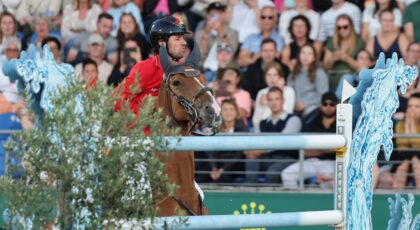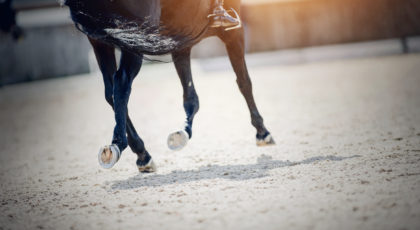When I was three months old, I was adopted from Peru by a single Canadian mother.
I’m 31 now. I don’t speak any Spanish. I know nothing about my birth family and I have never met anyone that looks like me.
My entire family is white. They speak Swedish and French and have never experienced racism. For most of my childhood, they believed it didn’t exist. But really, I think they turned a blind eye because they didn’t know how to confront it.
Growing up in Vancouver, I was surrounded by whiteness. Most of my friends were white, all my teachers were white, and so were all my neighbors. On the west side, you’re old money, new money or real estate rich—there’s little diversity. Not surprisingly, I grew up doing predominantly “white” activities, such as figure skating, skiing, equestrian sports and tennis.
It was like I had assumed a white identity with black skin—I was an Oreo. I knew nothing about my heritage, or anything about “being black.” And honestly, I didn’t care. All I wanted was to fit in with the white kids and my family.
But I never really did. We lived in parallel universes.
At age four, I had my first encounter with racism. I remember it clearly. I was at the playground near my house and I skipped away to ask the other kids if I could join in. The “queen bee” said I could, but there was a condition: I had to be the slave in the “basement” because my skin was black.
I just wanted to play with the other children so I agreed. At the time, I didn’t necessarily think it was wrong, but I also knew it wasn’t right and I didn’t feel good about it. But, like I said, I just wanted to be included.
So began a long journey of simply accepting racism as a part of life. Because of the color of my skin, I learned you just live with it.
It was a lesson often repeated, too.
As a child, I was often excluded from birthday parties. When I was invited, I remember being told by other kids that I had to play alone “because you’re black.” And I accepted it.
I was miserable at overnight camp because of the overtly racist camp leaders. When I brought it up to my white family, they didn’t believe it was happening—they dismissed my experience because it wasn’t their experience. That meant I had to suffer without any allies.
In high school, my peers often used the N word and subjected me to racist comments—from the Ugg boots I wore (“straight up N**** Uggs”) to my “fake” handbag collection (in their minds, all black people live in poverty). When someone objected they would say, “No, she’s cool with it, it doesn’t bother her at all.” But of course it did.
At University, I sat in a room with fellow students as President Obama was about to be elected and listened while several objected by saying “get the N***** out of office.” I did nothing and neither did anyone else.
I just lived with it. I don’t want to live with it anymore.
***
Animals—horses, in particular—have always felt safe to me and have helped me survive some pretty significant childhood trauma. Equestrian sports has been my passion since I started riding at age eight. My first lease was an Appy named Bracken. I went through Pony Club and Prince Philip Games. I dabbled in eventing, jumpers and, of course, rode ponies bareback as a kid.
Twenty-three years later, I am the owner of two beautiful Oldenburg horses and pull my own trailer. Horses are such a big part of my life. Some of my closest and longest friendships are within the horse world and many of my proudest moments have been achieved on a horse’s back.

But the equestrian world is not absent of racism, either. As many happy memories as I have, there are sad ones too.
I am usually the only black rider around and that can be spectacularly isolating. Folks seem to truly have no idea how to approach or confront topics of race. There were many times when I felt like I didn’t belong, that I never truly would.
I believe there are three types of racists: those who are obviously racist and intend no harm (eg, “I never saw your color, I don’t see color” and “do you tan even though your skin is black, just curious”); those who are subconsciously racist and don’t know it (ie, internalized black stereotypes); and those who are explicitly racist have intent to harm and oppress.
Sadly, this sport has all three and you never know when they will pop up. That is why it can often feel very unsafe in the equestrian world as a black rider.
Ironically, the most problematic racism is the subconscious racism. It’s most challenging to see is and, therefore, the hardest to fix.
Subconscious racism is the deeply embedded ideas society holds about how black people act, dress and function. The assumption that we can’t afford buy nice things, the stereotypes of the angry black woman or the violent black man, the over sexualizing of black women in fashion and portraying us as savages and criminals. Subconscious racism is one of the biggest contributors to systemic oppression.
Correcting this a deep rooted mindset requires first becoming aware of the biases you carry and then changing them within your own person. Work that even I as a black woman need to do.
***
With the Black Lives Matter movement continuing to dominate the headlines right now, many people ask “What is the solution? What can we do?”
As a starting point, please confront racism in the moment. Speak up and confront it boldly. Be an ally.
Implement anti-racism policies within the sport but ensure that BIPOC make up the majority on any diversity action or working group—BIPOC must be the ones leading these initiatives and must be consulted the entire way through. Ensure that you, your staff, and your barn are educated on racism. Read, listen and ask questions when appropriate.
And do not assume that a racist act is a minor offence—if you have never experienced racism, it’s not up to you to decide.
Within my own family, some individuals have come around and began to listen to and accept my experience as a black woman in a world of privilege. And that’s exactly the point isn’t it? The way forward is learning and growing together and the time to do that is now. You will make mistakes, we all will. But as long as people are willing to stop and listen, things will get better.
Because trust me, no one should ever have to live their life dodging racism.


 July 15, 2020
July 15, 2020 

























